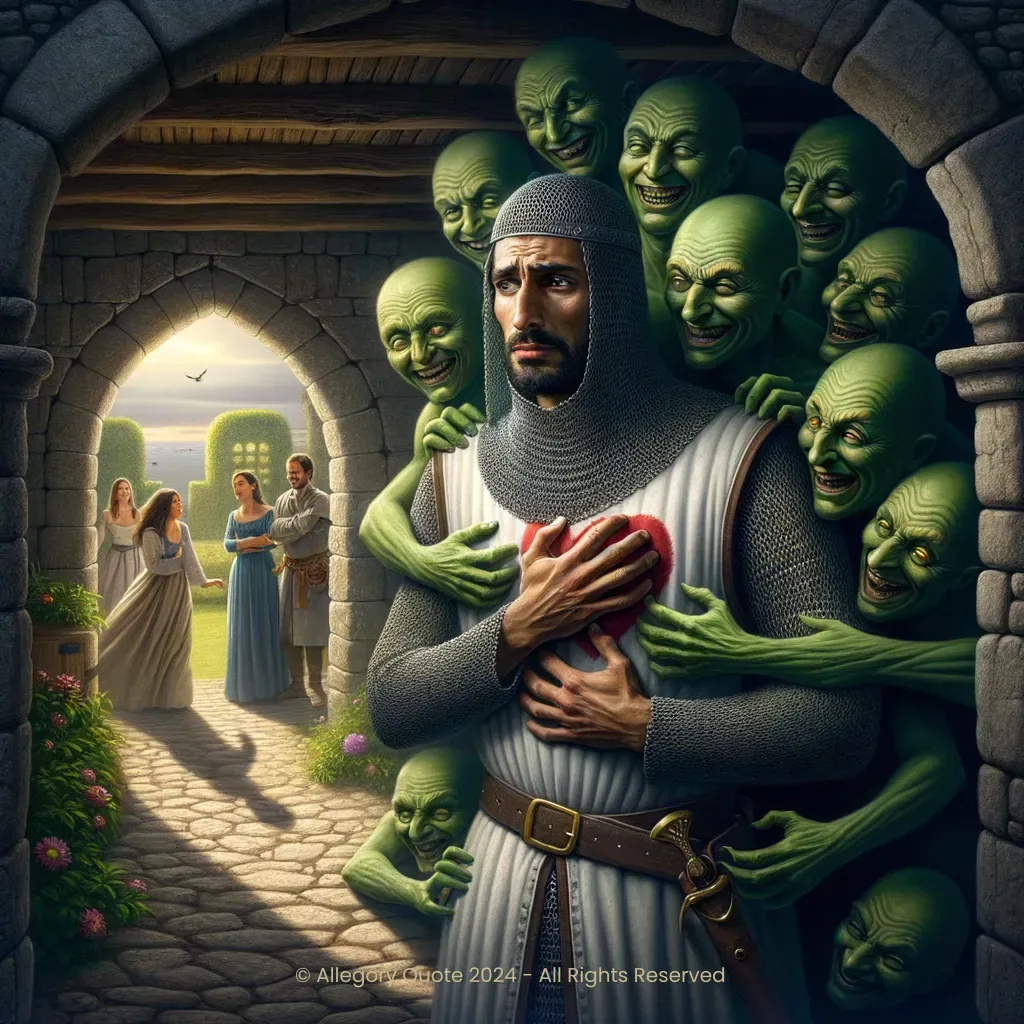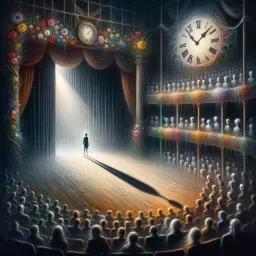”O, beware, my lord, of jealousy;
It is the green-ey'd monster which doth mock the meat it feeds on“

0
0
0
0
- Meaning
- The phrase cautions against jealousy, personifying it as a "green-eyed monster." This metaphor suggests jealousy is not only spiteful and grotesque but also consumes those who harbor it. It distorts reality and evokes mockery and misery in its victims. Shakespeare's message highlights the irrational nature of jealousy and its power to ruin lives.
- Allegory
- The image includes a majestic knight to signify strength and honor overshadowed by jealousy. The dark hallway and shadowy, green-eyed creatures represent the consuming and mocking nature of jealousy. The dim torchlight casting eerie shadows emphasizes the haunting presence of this emotion. In contrast, the scene of happiness and trust in the background symbolizes what jealousy undermines—peaceful, trusting relationships. The knight’s somber expression and the distance between him and the happy scenes highlight the isolating effects of jealousy.
- Applicability
- Understanding the destructiveness of jealousy can guide individuals to recognize and manage their feelings. In personal relationships, it underscores the importance of trust and open communication. By acknowledging and addressing insecurities or doubts, people can prevent jealousy from harming their bonds and mental well-being.
- Impact
- This phrase has had a profound impact on literature and popular culture. Shakespeare's personification of jealousy as a "green-eyed monster" resonates deeply, offering a vivid description that has been referenced in countless works of art, literature, movies, and everyday language. It has sparked discussions on the psychological effects and consequences of jealousy.
- Historical Context
- 'Othello' was written around 1603-1604 during the early 17th century. This was a time of intense social and political shifts in England, including the exploration and trade expansion. These changes often influenced themes in literature, like trust, betrayal, and the complexities of human nature explored in Shakespeare's works.
- Criticisms
- While widely accepted, this phrase could be criticized for oversimplifying or dramatizing the emotion of jealousy. Some argue jealousy can be a natural and even constructive emotion when managed properly, motivating self-improvement or attention to unmet needs in a relationship.
- Variations
- Across different cultures, variations of this phrase exist, often emphasizing jealousy’s harmful effects on individuals and relationships. For instance, in Buddhist philosophy, jealousy is seen as a source of suffering and a hindrance to enlightenment.
-

The empty vessel makes the loudest sound.
-

There was never yet philosopher that could endure the toothache patiently.
-

O, what a rogue and peasant slave am I!
-

Rich gifts wax poor when givers prove unkind.
-

Life's but a walking shadow, a poor player that struts and frets his hour upon the stage and then is heard no more.
-

I will praise any man that will praise me.
-

How sharper than a serpent's tooth it is to have a thankless child!
-

It is a wise father that knows his own child.
-

Words, words, mere words, no matter from the heart.
-

The smallest worm will turn, being trodden on.
-

Love all, trust a few, do wrong to none.
-

Come what come may, time and the hour runs through the roughest day.
No Comments